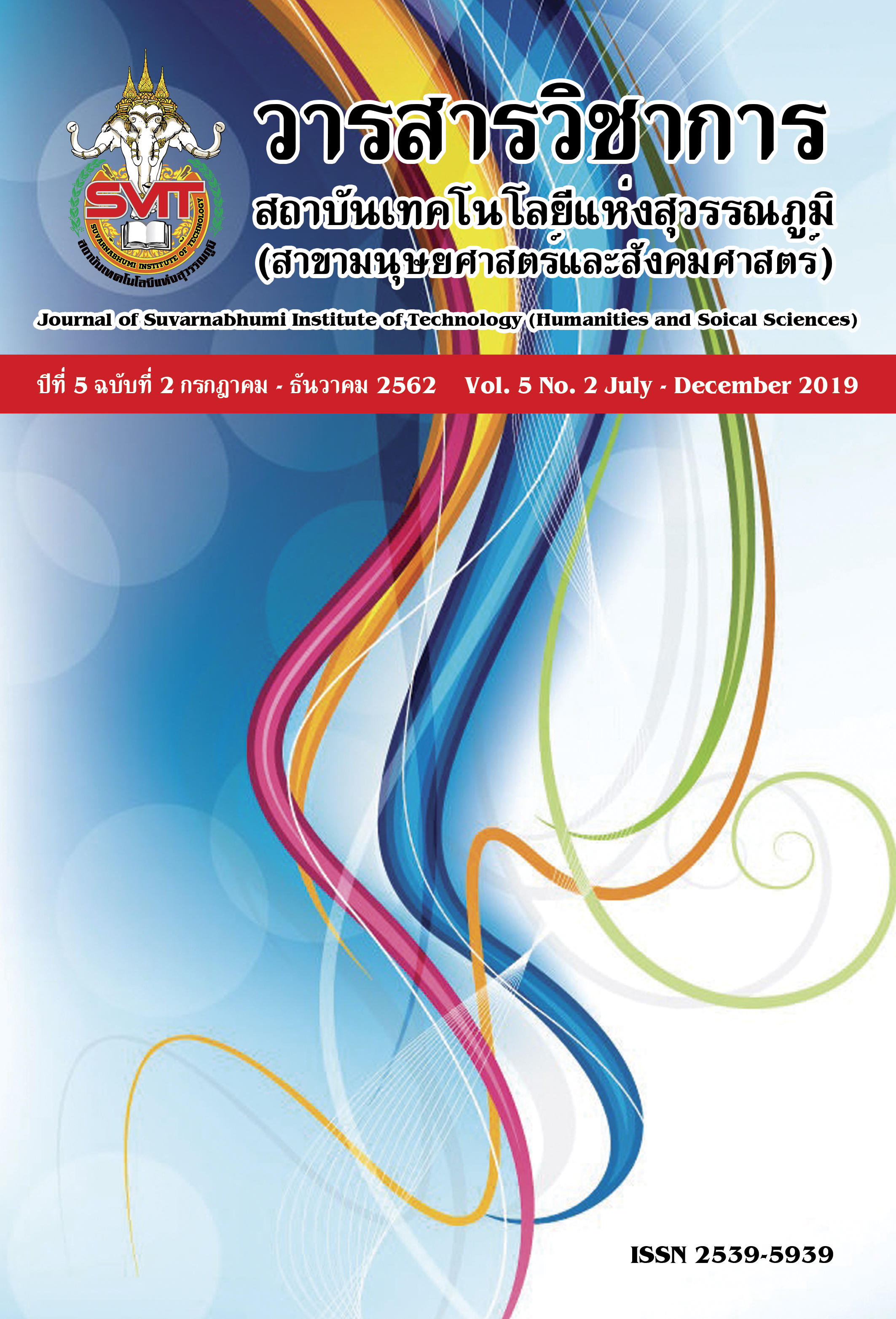A STUDY OF FACTORS AFFECTING THE EFFECTIVENESS OF MULTI-LEVEL MARKETING BUSINESS IN THAILAND
Keywords:
Effectiveness, Multi-Level Marketing BusinessAbstract
This research aimed to: 1) study the level of factors affecting the effectiveness and the level of effectiveness of multi-level marketing business in Thailand; 2) study the factors that influence the effectiveness of multi-level marketing business in Thailand; 3) proposed guidelines for improving the effectiveness of multi-level marketing business in Thailand. This research is mixed method design The research findings the factors influencing the effectiveness of multi-level marketing business in Thailand included leadership, organizational culture, commitment and the organizational climate, were rated at a high level. Also the average of the effectiveness of multi-level marketing business in Thailand was at the same level.
The results of the hypothesis test showed that leadership factor, Organizational commitment and organizational climate were directly affected the effectiveness of multi-level marketing business in Thailand, statistically significant. These factors can be predicted the variability of multi-level marketing business in Thailand by 67%.
The guidelines to improve the effectiveness of multi-level marketing business are 1) create leadership to the team leader at each level. 2) promote a collaborative atmosphere to gain the commitment within organization. In addition, the government should provide support by communicating the benefits in terms of economic value creation and positive image, as well as oversight of businesses that do not comply with the law.
References
ธนาคารกสิกรไทย. (2559). จับตาธุรกิจรุ่ง-ร่วง ปี 2560. ค้นเมื่อ 1 พฤษภาคม 2560 จาก https://www.kasikornbank.com/th/business/sme/
นวลปรางค์ ภาคสาร และจันทนา แสนสุข. (2559). อิทธิพลของบรรยากาศองค์กรและความยุติธรรมขององค์กรที่มีต่อประสิทธิผล,ในการทำงานของบุคลากรสังกัดสำนักงานคณะกรรมการการอาชีวศึกษา ในเขตจังหวัดพระนครศรีอยุธยา. วารสารบริหารธุรกิจเทคโนโลยีมหานคร,13 (1), 43-65.
เพ็ชราภรณ์ ชัชวาลชาญชนกิจ. (2556). ต้นแบบการบริหารจัดการที่มีประสิทธิภาพของโรงพยาบาล
รัฐ. ปริญญาปรัชญาดุษฎีบัณฑิต สาขาวิชาการจัดการ,บัณฑิตวิทยาลัย มหาวิทยาลัยสยาม.
ภัณฑิลา นุ่มสังข์. (2556). วัฒนธรรมองค์กรและทัศนคติและบรรยากาศในการทำงานที่มีผลต่อประสิทธิผลในการปฏิบัติงานของพนักงานระดับปฏิบัติการ กรณีศึกษาพนักงานระดับปฏิบัติการพนักงานบริษัทในพื้นที่ย่านถนนเพลินจิต และถนนสุขุมวิท. สารนิพนธ์ หลักสูตรบริหารธุรกิจมหาบัณฑิต,มหาวิทยาลัยกรุงเทพ.
ภัทรลภา ลิ้มกิติศุภสิน. (2556). ความสัมพันธ์ระหว่างความผูกพันต่อองค์กรกับการมีส่วนร่วม ในการพัฒนาคุณภาพการบริการพยาบาล. สารนิพนธ์หลักสูตรปริญญาบริหารธุรกิจมหาบัณฑิต,มหาวิทยาลัยเทคโนโลยีราชมงคลธัญบุรี.
มะลิวรรณ อรรคเศรษฐัง และสายตา บุญโฉม. (2559). บรรยากาศองค์กรที่ส่งผลต่อประสิทธิภาพในการปฏิบัติงานของบุคลากร สำนักงานสรรพากรพื้นที่กาฬสินธ์. เอกสารการประชุมวิชาการและเสนอผลงานวิจัยระดับชาติ ครั้งที่ 3, วิทยาลัยนครราชสีมา, 531-537.
สาธิต สุวรรณประกร และสมยศ อวเกียรติ. (2559). ปัจจัยที่ส่งผลต่อผลการปฏิบัติงานของพนักงานรักษาความปลอดภัย.วารสารเกษมบัณฑิต, 17 (1), 56-72.
สุมณธกาญจน์ วุฒิพงศ์วรากร. (2558). การศึกษาอิทธิพลปัจจัยแห่งความสำเร็จของนักธุรกิจ เครือข่ายและปัจจัยในการตัดสินใจซื้อที่ส่งผลต่อความพึงพอใจของผู้บริโภค. วิทยานิพนธ์ หลักสูตรบริหารธุรกิจมหาบัณฑิต สาขาวิชาบริหารธุรกิจ, วิทยาลัยพาณิชยศาสตร์ มหาวิทยาลัยบูรพา.
Asiedu, M., Sarfo, J.O., & Adjei, D.(2014). Commitment and Organizational Citizenship Behavior: Tool to Improve Employee Performance; an Internal Marketing Approach, European Scientific Journal, 10(4), 288-305.
Cochran, W.G. (1953). Sampling Techiques. New York : John Wiley & Sons. Inc.
Colette M. Taylor, Casey J. Cornelius & Kate Colvin. (2014). Visionary leadership and its relationship to organizational effectiveness, Leadership & Organization Development Journal, 35 (6), 566-583, https://doi.org/10.1108/LODJ-10-2012-0130
Eres, F. (2011). Relationship between teacher motivation and transformational leadership:
Characteristics of school principals. International Journal of Education, 3(2), 1-17.
Greenberg, J & R. A. Baron. (2005). Behavior in Organizations. 8 th ed. New Jersey: Prentice Hall.
Hall, D. T., Schneider, B. & Nygren, H. T. (1970). Personal factors in organizational identification. Administrative Science Quarterly, 15 (2), p. 176.
Kuean, W. L., Khin, E. W. S. & Kaur S. (2010). Employees’ Turnover Intention to Leave: The Malaysian Contexts. The South East Asian Journal of Management, 2010(4), 93-110.
Moon, Y. J., Hahn, J. H., Kim, W., Ko, M. J., & Lim, G. H. (2012). Ethical leadership on employees in new SMES: Exploring the moderating effect of gender. Business and Entrepreneurial Studies, 20(12), 499-512.
Mowday, R. T. (1982). Employee Organization Linkages: The Psychology of Commitment, Absentism and Turnover. New York: Academic Press.
Ruppel, C. P. & Harrington, S. J. (2000).The Relationship of Communication, Ethical Work Climate, and Trust to Commitment and Innovation. Journal of Business Ethics, 2000(25), 313–328.
Sheldon, M. E. (1971). Investments and involvements as mechanisms producing commitment of
the organization. Administrative Science Quarterly, 16 (2), 142 - 150.
Downloads
Published
Issue
Section
License
The articles published are copyrighted by the Sarasas Journal of Humanities and Social Science. The opinions expressed in each article in this academic journal are those of the individual authors and do not reflect the views of Sarasas Suvarnabhumi Institute of Technology. The authors are solely responsible for all aspects of their respective articles. Any errors or inaccuracies in the articles are the sole responsibility of the authors.



